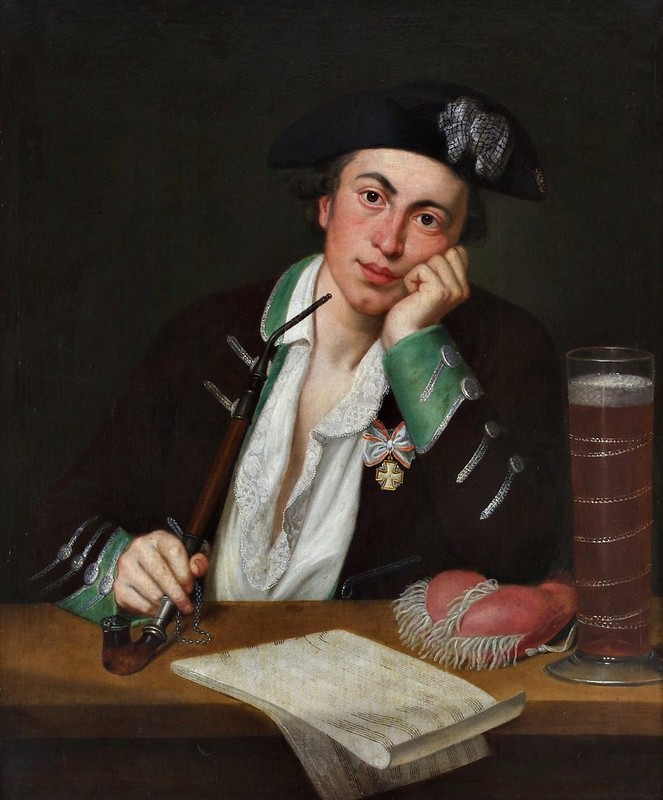Joseph Martin Kraus (1756-1792)
- Aria (B-Dur) 'Kom din herdestaff att bara' (1789)
Performers: Adа Gunnаrs (soprano); Hеrnаn Iturrаldе (bass); Kammerorchester Sttutgаrt;
Hеlmut Wοlf (conductor)
Further info: Joseph Martin Kraus (1756-1792) - Symphonies
---
German-Swedish composer. He received his earliest musical education in
the central German town of Buchen im Odenwald and during the years
1768-73 was educated in Mannheim, where his teachers included members of
the Mannheim Kapelle. He studied at the universities of Mainz
(philosophy), Erfurt (law) and, after an interruption due to family
troubles, Göttingen (jurisprudence). During this period he published a
collection of poems under the title Versuch von Schäfersgedichte (1773)
and a drama Tolon (1776), as well as writing a number of sacred works,
including the oratorios Die Geburt Jesu and Der Tod Jesu. While in
Göttingen he became acquainted with members of the Göttinger Hainbund, a
Sturm und Drang literary circle under whose influence he wrote the
treatise Etwas von und über Musik fürs Jahr 1777 (1778), which devotes a
large section to a thorough critique of Anton Schweitzer’s opera
Alceste. In 1778 a Swedish student, Carl Stridsberg, persuaded Kraus to
accompany him to Stockholm and try his fortune at the court of Gustavus
III. For three years Kraus struggled in poverty to obtain an official
position; his Sturm und Drang opera Azire was rejected by the court,
although he became known as a conductor at the public concert series.
During this period he wrote articles for Stockholms Posten and Dagligt
Allehanda. In 1781 he was finally elected to the Swedish Royal Academy
of Music; his opera Proserpin then won him the post of assistant
kapellmästare at court and at the Royal Opera. A commission to provide
the inaugural work for the new theatre in 1782 (Aeneas i Cartago) was
undermined at the last minute, and he was sent by Gustavus III on a
study journey throughout Europe to observe the latest trends in the
theatre. This four-year grand tour took him to Germany, Austria, Italy,
France and England. In Vienna he met Haydn, who considered him an
original genius on the level of Mozart, Salieri and Gluck, who stated:
‘That man has a great style, the like of which I have found in no one
else’. Here he also became a member of the same masonic lodge as Mozart.
In Italy he wrote elaborate descriptions of the theatres in Naples and
Rome as he accompanied his patron on a state visit, and his lengthy
review of Piccinni’s Didon, which he saw in Paris in 1785, was published
(1786). In London he attended the second Handel Commemoration before
returning late in 1786 to Stockholm. In 1787 he was appointed chief
educational administrator at the Royal Academy of Music, and the
following year succeeded Uttini as hovkapellmästare. A popular composer
at the public concerts and for the Stockholm theatres, his music
included the ballet Fiskarena (1789), the drama with music Soliman II
(1789) and a large portion of the pasticcio Äfventyraren (1791) in
addition to numerous shorter stage works. He achieved a reputation for
the discipline of the Hovkapell and became one of the earliest leaders
to conduct almost exclusively with a baton. He also became a close
friend of the poet and singer Carl Michael Bellman, with whom, along
with other intellectuals, he formed the Diktarkretsen (Poetry Society), a
literary and musical circle. He died of tuberculosis shortly after the
assassination of his patron Gustavus III at a masked ball. Kraus can be
considered the most original and notable composer in Sweden during the
Gustavian period. His German education, coupled with his experiences
during his grand tour, gave him a cosmopolitan outlook that was absorbed
into his music. As early as 1778 he declared himself an ardent admirer
of Gluck and Grétry, who served as his models and whose works he knew
from memory. His participation in the debate on opera in the Stockholm
newspapers Stockholms Posten and Dagligt Allehanda, 1778-82, shows much
concern with the fusion of drama and music. He had difficulty, however,
in getting his own major operas performed. During the period 1787-92, on
the other hand, he was a popular composer whose other music for the
stage was highly prized.

Cap comentari:
Publica un comentari a l'entrada